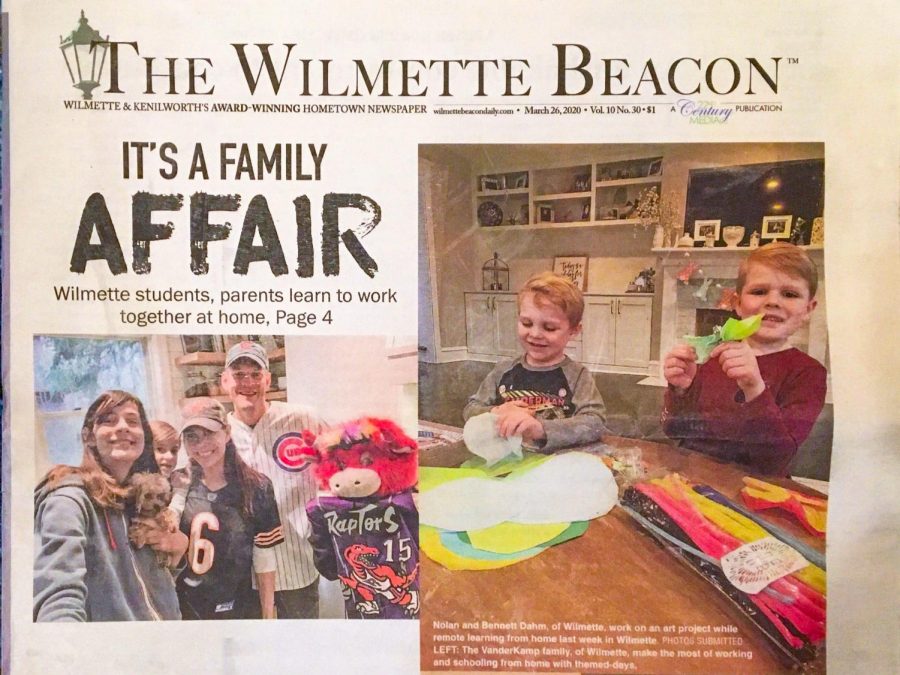Newspaper company folds after 15 years covering local news
Because of COVID-19, advertising revenue for 22nd Century Media dried up
On Tuesday Mar. 31, 22nd Century Media laid off most its staff of approximately 50 and closed its doors.
The company, which operated for 15 years and owned 14 Chicago-area weekly newspapers–including the Wilmette Beacon, Winnetka Current, and Glencoe Anchor–attributed its shutdown to a severe lack of advertising caused by the Coronavirus.
“We were having a great year, and then … March,” 22nd Century Publisher Joe Coughlin said in a Chicago Tribune article. “Advertising and revenue collection just stopped.”
The company had hoped that switching to online-only publications and making a push for online subscriptions would allow them to weather the financial hardship caused by COVID-19. It soon became clear that even those changes would not be enough to keep the company afloat.
Reflecting on the almost eight years that freelancer Alexa Burnell spent working for 22nd Century Media, one thing that stood out to her was the community that the company had worked to build.
“While the non-profits and small firms I’ve worked for [are] great, 22nd Century Media was by far the best experience. Each editor was passionate about the communities they represented and treated freelancers like family,” said Burnell.
Freelancer Hilary Anderson, who spent close to 10 years writing for 22nd Century media, was particularly proud of the service the company was able to provide to members of the community.
“I love what I do and I’ve thoroughly enjoyed working for the paper. The papers fill a niche in the community that no one else can,” said Anderson. “Other publications don’t have the expansive ability to go into the community.”
Over the years, Anderson, Burnell, and other 22nd Century journalists were able to document and inform the community about countless community events, fundraisers, Chamber updates, and celebrations. They wrote articles about local businesses, student actors, athletes, and Scouts. Their work provided an outlet for residents to tell their stories, and for the community to stay connected.
“What I most loved about this job was the excitement from the subjects when their stories ran. Knowing I could tell their stories and share with the community is something I’ll miss very much,” said Burnell.
Glenview resident Brenda Bridges thought it was nice to have a truly local paper that represented the community, informed the public, and connected neighbors to one another.
“I really don’t know what could replace it. It was also a ritual to see it every week and leaf through,” said Bridges.
Bridges also noted the positive impact that the paper had on local businesses.
“The other thing it did allow was for local businesses to get in front of community members in an affordable way,” Bridges said. “I’m not sure what will replace that and wonder if other businesses will suffer because it’s not longer in print.”
22nd Century Media’s closure is one example of a much larger trend. As businesses (especially those that are small and local) across the country have been suffering from the coronavirus, so too has the news media industry.
“All told, an estimated 33,000 employees of news media companies in the United States have been laid off, furloughed or had their pay reduced since the arrival of the coronavirus,” reported a New York Times article.
To Burnell, these challenges that the news media industry faces will be felt not only by those employed in it but also by everyone else in the community.
“Once our world is up and running once again, it will be a shame knowing how many stories are not being told. I’m still receiving countless pitches and it breaks my heart to tell great folks that our papers no longer exist,” said Burnell.
Anderson hopes that as the economy starts to get back on its feet, advertising will come back in full force and allow once again for hyperlocal journalism to thrive.
“I just hope for the community’s good that somehow the support is given for these papers to come back,” said Anderson.








































Dillan
Jun 13, 2024 at 12:41 pm
Good. This journal published a ridiculous piece on 40 New Trier seniors in Spring of 2020 who received drinking tickets at a Glencoe house party. The publication listed each senior by name, despite numerous calls from the individuals and families concerned about the article jeopardizing college admissions for the already-accepted seniors. The families and students were right, and the article created an enormous challenge for several families. Good riddance to over a decade of subpar “journalism.” These publications should support our community, not harm it.